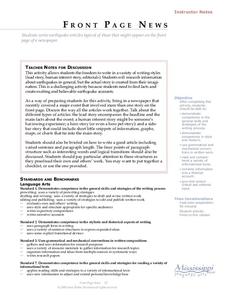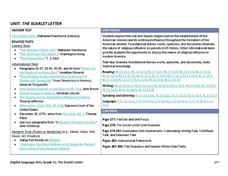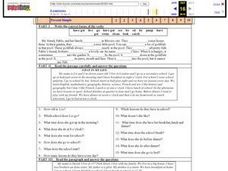Curated OER
Pieces of the Past
Students study the importance of preserving the archaeological record. They write a paragraph describing an object and why it is important to them. They cut their paper into a puzzle and compare their own to the student they trade with.
Curated OER
Front Page News
Students write original earthquake articles typically found on the front page of a newspaper. Each student has the freedom to write in a variety of writing styles (lead story, human interest story, editorials, etc.). They research...
Curated OER
Geometry Project
Proofs are usually an intimidating assignment. An engaging lesson focused on geometric proofs may reduce the anxiety! Pupils choose between several triangle proofs to complete and work on completing them. The...
Minnesota Literacy Council
Grapes of Wrath and Pronouns
Many regard John Steinbeck's The Grapes of Wrath as the great American novel. The lesson plan combines a variety of strategies, including partner work, independent practice, creative writing, grammar instruction, and small group...
K12 Reader
Appositive Hunt
How do you find appositives? Why you look for clues, those words or phrases, set off by commas, that tell readers more about nouns. Young grammarians can practice finding them with this worksheet.
Mathematics Vision Project
Geometric Figures
Logical thinking is at the forefront of this jam-packed lesson, with young mathematicians not only investigating geometric concepts but also how they "know what they know". Through each activity and worksheet, learners wrestle with...
Curated OER
Sun and Shadows
Why do shadows look different in the summer than in the winter? What causes day and night? How can a sundial be used to tell time? Answer these questions and more through two engaging lessons about light and shadows. Fourth and fifth...
Louisiana Department of Education
The Scarlet Letter
Use Nathanial Hawthorne's immortal text on the influence of religion on the early American settlements, as well as its continued impact on American culture, with a unit that focuses on The Scarlet Letter. In addition to Hawthorne's...
EngageNY
Grade 10 ELA Module 2: Unit 2, Lesson 6
How do authors use rhetorical devices and word choice to emphasize their ideas? Pupils consider the question while reading paragraphs 16–19 from Julia Alvarez's essay "A Genetics of Justice." Readers engage in evidence-based discussion...
Florida Center for Reading Research
Vocabulary: Word Meaning: Know or No
Activate the prior knowledge of young scholars as they expand their vocabulary with this language arts activity. Given a deck of cards containing new vocabulary words, learners sort them into four categories, from Don't know the meaning...
Have Fun Teaching
When Am I? (16)
How can you tell when a story takes place? Use context clues to infer the time of day and seasons of five short reading passages. Kids then note each passage's time period as daytime or nighttime, as well as winter or summer.
EngageNY
Introducing Module 4B: “Water Is Life”
Learners take a gallery walk around the classroom to view various images and quotes. As they walk, they write down what they notice and wonder about what they see. After discussing their notice and wonder notes, they read the...
Curated OER
“THE LORAX” by Dr. Seuss
Few children's books convey the message of conservation as well as Dr. Seuss' The Lorax. Read the story aloud, emphasizing the interconnectedness of plants and animals in an ecosystem and discussing different ways people can help...
National Sailing Hall of Fame
Sailboat Design Requirements
Sailboat design requires more than a half-circle and triangle sketch. After viewing a slideshow presentation that outlines the requirements for sailboat design, learners draw a design, perform the needed...
CPALMS
Analyzing Vonnegut's View of the Future and His Commentary on the Present in Harrison Bergeron
Kurt Vonnegut's short story "Harrison Bergeron" engages adolescents with its theme about the dangers of complete societal equality. Learners complete a graphic organizer to track literary elements in the story, as well as an inference...
Curated OER
The Artist's Statement
Wouldn't it be great to be able to get inside an artist's mind, or be able to question the artists about who they are, why they create, and why they think their work is important? An illustrative resource asks artists to provide...
Sean Banville
New Year's Day
Focus on a passage about the new year with your English language learners. You can start with reading the passage aloud to your class, and then launch into the related activities. Pupils match phrases, complete cloze-style activities,...
EngageNY
Structuring The Search: Categorizing Our Research
What can you contribute? Scholars read text to determine how ants contribute to the rainforest. First, they categorize and sort facts gathered from reading. Next, readers focus on specific terms in each paragraphs of the text Ants by...
K12 Reader
The Scientific Method
Introduce the scientific method with a reading comprehension activity. Have kids read a few paragraphs that describe the process of making a hypothesis, gathering evidence, and taking notes that will support the experiment.
US Citizenship and Immigration Services
Thanksgiving 1—Pilgrims and American Indians
The Pilgrims first arrived in America in order to gain religious freedom. Here is a lesson plan that takes the class on this journey with the Pilgrims, stopping to look at how they got here, who they met when they arrived, and a peek...
Consortium for Ocean Science Exploration and Engagement (COSEE)
Climate Change Impacts on Blue King Crabs
Carbon dioxide is not only causing global temperatures to increase, it causes the oceans to become more acidic. Lesson focuses on the blue king crab and the fragility of the habitat due to climate change. Scholars create a concept map...
Curated OER
A Sentence for Life
What is a sentence? Second graders will explore the components of a sentence in the ten lessons of this unit. The subject, predicate, the process of proofreading, punctuation, and sentence sequence are analyzed in this unit. Handouts and...
Curated OER
SATP Informative Essay I
Students explore the basic steps of writing an informative five paragraph essay. Using a hamburger as an analogy, students discuss the five part method of writing and, given blank hamburger sheets, they fill in the main parts of the...
Curated OER
Present Simple Verb and Comprehension Worksheet
In this verb form and comprehension worksheet, students fill in 25 blanks with the correct verb forms in 2 paragraphs. They read 2 short paragraphs and answer 23 short answer questions based on their comprehension of the reading.
Other popular searches
- How to Paragraph Writing
- Writing How to Paragraphs
- Writing a How to Paragraph
- Writing a How to Paragraph
- How to Paragraph Revision
- Writing How to Paragraphs
- How to Write 5 Paragraph Essay

























